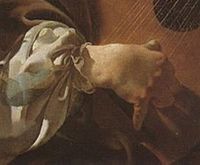
The Castalian Band is a modern name given to a grouping of Scottish Jacobean poets, or makars, which is said to have flourished between the 1580s and early 1590s in the court of James VI and consciously modelled on the French example of the Pléiade. Its name is derived from the classical term Castalian Spring, a symbol for poetic inspiration. The name has often been claimed as that which the King used to refer to the group, as in lines from one of his own poems, an epitaph on his friend Alexander Montgomerie:
Quhat drowsie sleepe doth syle your eyes allace
Ye sacred brethren of Castalian band— James VI[1]
The notion of the 'Castalian band' in 20th-century scholarship derives in the main from a 1969 book by Helena Mennie Shire.[2] It was H. Mennie Shire and her collaborator Kenneth Elliot – who had produced The Music of Scotland (Cambridge 1964) – who drew particular attention to the verse lines by James, remarking that "It has been well suggested that King James' name for his poets at court, or their name for themselves, was 'the brethren of Castalian band.'" However, apart from this verse, no scholar has produced any clear evidence for any such self-aware grouping. Nevertheless, other writers (and numerous websites) have seized on the concept. In a celebrated article from 2001, the literary scholar Priscilla Bawcutt examined the claims closely,[3] and – in the opinion of most modern authorities – demolished them.[citation needed]
However, the persistence of the idea of the Castalian Band has its own interest – as Bawcutt noted, suggesting that it is grounded in a desire to identify a strong Scottish Renaissance culture.[3] Poetry, and more especially song, had suffered as a result of the Reformation of the Scottish Protestant church concluded in 1560, and it may have seemed desirable to offer a more positive image for the later 16th century.
Whether or not there ever was such a Court grouping as the Castalian Band, it seems likely that there were cultivated circles of educated gentlemen in Scotland at the time. The King wrote a detailed treatise intended to establish a standard of practice in Scots poetry – his Reulis and Cautelis – and there may well have been gatherings of poets at James' court. The activities of some of the poets recognized to be working in Scotland at the time are known to a limited extent.
The principal literary figure to be directly associated with the court was Alexander Montgomerie. Music may also played an important part in performances; some of the poems of Montgomerie and others are known to have been set as song.
- ^ James Craigie (ed.). The Poems of King James VI of Scotland, 2 Vols. Scottish Text Society, 1955 and 1958.
- ^ Helena Mennie Shire (1969). Song, Dance and Poetry at the Court of Scotland under King James VI. Cambridge University Press.
- ^ a b Bawcutt, Priscilla (October 2001). "The Castalian Band – a modern Scottish myth". Scottish Historical Review. LXXX, 2 (210): 251–259. doi:10.3366/shr.2001.80.2.251.